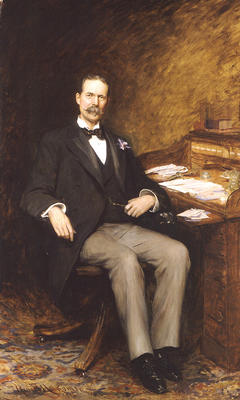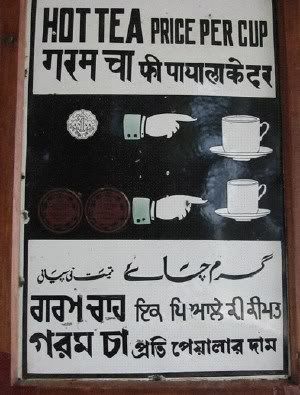I am sitting in front of my computer, listening to my favorite “Vital Signs” song:
Ye shaam phir nahi aaye gi
(This evening won’t come again)
I am smiling and sipping on my favorite Lipton Tea, while my fingers are keying in this moment in time.
All in all, a very coordinated effort is going on between my mind and soul. But take “Lipton tea” out of this equation and I’ll be left to a bored-to-death person listening to an archaic ancient group which historians remember by the name of ‘Vital Signs’ from early 90s and writing these disjointed words.
“Lipton Tea” – these two words stir deep memories in me. The earliest memory of Lipton tea in my life is drinking it with my maternal great grandfather (paR-nana).
 This portrait to the left, by the way, is of Sir Thomas J Lipton; not of my paR-nana!).
This portrait to the left, by the way, is of Sir Thomas J Lipton; not of my paR-nana!).
My great grand father was born in 1896 and lived till 1986. Until his last days he had a habit of making a cup of tea around 3 pm, and whenever I was around (which I always was) he used to pour some tea in my cup too. After that both of us would start watching PTV which started its daily transmission around 4 p.m. and sip on our tea.
Grandfather had migrated to Pakistan from India in 1947. He used to tell me all these great political stories from the old days, the Caliphate Movement, First World War, Quit-India Movement, Second World War, the Pakistan movement and finally the emergence of Pakistan.
He told me that until 1900s not many people in India knew about drinking tea (except for the tea growing areas of Darjeeling/Assam etc). British and whatever was left of East India Company at that time owned all the tea plantations in India, Ceylon (SriLanka), and Africa. Raw tea leaves were sent to London at Lipton Tea Company and after being processed and packed, was brought back to India and sold at exorbitant prices to the local people, on whose land the tea grew in first place.
Grand father told me that in the early 1900s Britishers used to set tea-stalls at street corners all over India and used to offer ‘free’ tea cups to Indians to promote the Lipton brand. In the beginning tea drinking was fashion at the high echelons of Indian society. Nawabs, and Rajas used to drink it in parties but within years its use grew all around and it even reached the far-flung villages of India.
 The accompanying picture to the right is a tablet that was placed at Bahawalnagar railway station in early 20th century. It is now placed in Pakistan Railway’s Heritage Museum at Golra Sharif near Islamabad. It advertises making of hot tea in 5 different written scripts; English, Devnagri, Urdu, Gormukhi and Bengali.
The accompanying picture to the right is a tablet that was placed at Bahawalnagar railway station in early 20th century. It is now placed in Pakistan Railway’s Heritage Museum at Golra Sharif near Islamabad. It advertises making of hot tea in 5 different written scripts; English, Devnagri, Urdu, Gormukhi and Bengali.
Grand father told me that drinking tea at 3:00 p.m. sharp was a British tradition brought to India. British used to drink tea two times a day en-mass. First time was at 3:00 p.m. (called ‘low tea’) and then again at 6:00 p.m. (called ‘high tea’). Low tea and high tea were the names given to this tea drinking habit just like breakfast-lunch-dinner.
The invention of the habit of afternoon tea is credited to Anna, Duchess of Bedford, who in about 1840 began taking tea with sandwiches and cakes to ward off “that sinking feeling” around four o’clock in the afternoon. Since the upper classes ate dinner fashionably late, Anna and her friends found that tea and small cakes were perfect to tide them over between lunch and dinner. Her idea soon became the fashion, and an English institution was born called ‘low tea’.
I guess grandfather and I kept the tradition alive in Karachi till 1986.
Last time I was in Pakistan I saw tea stalls and tea-shops at almost every street corner. It looks like the whole population now craves tea. And it is a part of our daily life. I won’t say its addiction, but would rather recite the famous sher by plagiarizing it a bit:
Chai se gharz-e-Nishat hai kis roo-siaah ko
Ik gona-e-bay-khudi mujhay har dum chahiyay
(Who the cursed-face needs pleasure out of tea
All I need is a place of solitude.)
Tea is also an essential part of Urdu literature. Shafiq-ur-Rehman who along with Mushtaq Ahmed Yousufi is perhaps the greatest humor writer of Urdu invented the term chuhaas which rhymes with pyaas(thirst) and means a thirst of tea.




















































Roshan has a very valid concern, Importing tea not only enlarges our import bill, but it also adds to our import decifit against India. If the trade is in local terms (and does not involve US dollars) then it results in a direct deficit of Pakistani Rupee agiant Indian.
One possible solution that I have tried to devise, is to prepare a tea by taking 1/10th of a tea spoon of tea leaf (chai ki patti) and boil it in one cup water with a dash of lemon. In the tea cup you can prepare a paste of Lemon with a spoon of sugar, when the tea comes to boil, pour it in! Walla (warnign: strong dashes of lemon can cause teeth decay if taken too many times a day)
Now, Let me remake this scene with my modified (and economically viable) Tea, and Vital Signs.
PS. What an amazing and timeless song it is!
Adil,
From the very begining Anwar Masood allegorically presents Tea (Leader of Opposition) and Lassie (Leader of the House). But the argument from both sides is so strong and logical that Milk (Judge) is unable to take any decision.
In the end Lassie prays from God:
“Rab karey nee iko varee ghut bharay koee tera,
Tera vee angraizan wango patia jayay dera”
The essence of above verse is:
I pray to God that one should take only one sip of yours
And you should also leave like the British rulers.
Roshan
need to hear the poem again…. but my recollection is that the poet’s clear favorite is Lassi at the end, no?
Became a fan of Civil Junction a year or so ago when I first went their …. the offerings were good but the menu and titles of the food was absolutely superb…. had not seen thsi Newsline story… thanks for it… woudl highly reccomend to all readers
It is wonderful dialogue and Lassie sarcastically says to Chai for her arrival as a visitor and finally became the custodian of the house!!! It seems both the characters (tea and lassie) are presenting their point of view so strongly, even we are indecisive of our final support http://www.apnaorg.com/poetry/anwar/audio.html
Civil Junction Cafe (Islamabad) has very interesting menu which depicts our national and regional politics like Ultra Naive Doodh Patti (UNDP), Musharraf’s Guesspresso, Murgh Malaee Aaloo (MMA): You will enjoy reading this interesting article on the menu: http://www.newsline.com.pk/NewsMay2004/foodline1ma y.htm
Here is a ‘sher’ from Anwar Masood on a cup of tea. It is part of a ghazal, hence the ‘qaafia’: ‘jaaye hai’
sirf darya par nahiN mauqoof aisi khal-bali
chai ki piyali meiN bhi toofan paaya jaaye hai
It roughly tranlsates to following:
A river is not the only place with chaotic waters
A storm can be found in a cup of tea too